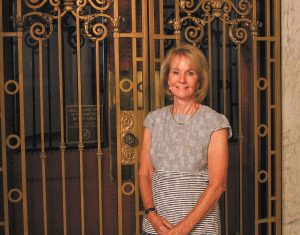Expectations didn’t hold Robyn Moberly back from doing what she wanted.
The recently retired bankruptcy judge for the U.S. District Court for the Southern District of Indiana was encouraged to pursue two traditional career paths for women when she entered college in the 1970s.
“I grew up in a different era than today, and most people anticipated that women would become nurses or teachers because it blended so well with having a family. And certainly my parents had that expectation for me, and so they insisted that I major in elementary education,” Moberly said.
She graduated from Indiana University Bloomington in 1975 with a degree in elementary education and economics.
Moberly said she couldn’t really get a job with an economics major without also going to graduate school.
As she was considering graduate school, she was surrounded by high-achieving women in a sorority house.
“Since a lot of the women were going to law school, and many are now physicians, surgeons, I kind of started thinking outside the box, and that’s what pushed me to go to law school, was the women I was around,” Moberly, who received her J.D. from the Robert H. McKinney School of Law in 1978.
A different era
But the obstacles for a woman entering law didn’t end after law school.
“It wasn’t perceived to be illegal to discriminate on the basis of gender. So law firms were pretty blunt, and some of my favorite lawyers today are in a firm that came out and said we won’t hire a woman in our law firm because all the partners are men, and we just don’t know what we would do with a woman here,” Moberly said.

She said that didn’t make her angry–it was a different era.
“I wasn’t all that shocked, because I knew that was the prevailing view, and I wasn’t all that offended. I didn’t want to be hired someplace where they wouldn’t feel comfortable with me,” Moberly said.

Deborah Caruso, a bankruptcy attorney at Rubin Levin, said she and Moberly were in the minority in law school and when they first started practicing law.
“We just kind of put our heads down and work really, really, really hard, and established ourselves through hard work, reputation, maybe ignoring to a certain extent some of the issues that presented themselves being a minority in a practice that was dominated by males,” Caruso said. “And when I mean ignoring, I mean that we just moved forward.”
‘Incredibly driven’
Moberly spent years as a trial court judge in Marion County after running for the bench in 1996.
It’s a role she never initially thought of pursuing until someone told her a certain attorney was running and she didn’t see a difference between their qualifications.
“I thought, ‘Well, gosh, I know her. I like her very much, but she’s not more qualified than I am. So if she can do it, I can do it,’” Moberly said. “I jumped in with both feet. I never before would have dreamed that this profession, being a judge, was something that I could do. We should all have the attitude that if we want something, figure out how to get it.”
In 2012, her rise to the bankruptcy bench made history as she became the first woman bankruptcy court judge court for Indiana’s Southern District. Moberly said it was long overdue.
“It felt good to open a door for other women,” Moberly said.
She added that notable memory as a judge was the USA Gymnastics bankruptcy case.
Following lawsuits that revealed sexual abuse by gymnastics team doctor Larry Nassar, the organization filed for bankruptcy.
Moberly said most of the lawyers in the case were women.
“It was a case where, as you looked out into the well of the courtroom, there were women almost exclusively, which was unusual, and I thought, very appropriate for that kind of case,” Moberly said.
That case was her most notable to preside over for many reasons, including the intellectual challenge, and she thought the outcome was kind and fair.
Caruso was part of the Indiana counsel for the survivors committee.
“This was a very emotional case. Obviously women suffer a lot, but they’re survivors, and because of her time on the state bench dealing with many insurance issues, she did a marvelous job at rendering decisions which guided the case towards settlement,” Caruso said.
She said the case was able to give some closure to the women.
Chief Bankruptcy Judge Jeffrey Graham called Moberly an “outstanding bankruptcy judge” in a news release announcing her retirement, which became official on June 7.
“Judge Moberly’s significant experience as a trial judge allowed her to capably handle any type of case, be it a nationally publicized complex chapter 11 reorganization to a typical chapter 13 ‘cattle call’ calendar,” Graham said in a press release. “Perhaps more importantly, Judge Moberly helped open the door for women to become bankruptcy judges in Indiana, thereby strengthening both the bench and the bar. She has served with distinction, and her wit and intelligence will be greatly missed.”

Julie Armstrong, Executive Director of the Indianapolis Bar Association, called Moberly caring and ready and willing to help when needed.
“She just is incredibly driven,” Armstrong said. “But driven to be kind and fair.”
Armstrong said that when Moberly applied for the federal bench it never occurred to her it would be unique.
Moberly’s plan now that she is retired is to continue her nonprofit and volunteer work. She also has grandchildren that live out of state, so she wants to spend more time with them.
Her husband is also a retired lawyer, but she joked lawyers tend to “dribble it out a bit” when leaving a firm, unlike the federal judiciary.
She added that she looks forward to nurturing her relationships with women that she hasn’t previously had the time to spend time with.
“I’ve just been extraordinarily lucky, and I have loved both being a state court judge and being a bankruptcy court judge,” Moberly said. “It’s a phenomenal job that I feel so lucky and fortunate that I got to do.”•

